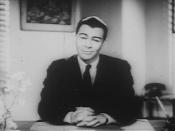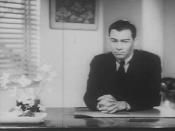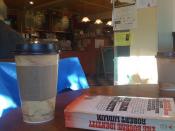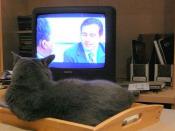Bartleby's Struggle When we think of protests and people who use passive resistance to fight against something the first thing that comes to mind is usually the civil rights activists or a group of freedom fighters fighting for a cause; however, this is not the case in Herman Melville's "Bartleby"ÃÂ. Bartleby is a quiet man who seems to be fighting a battle against an invisible army. When he comes into the narrators office to aquire a job he seems to be a "normal"ÃÂ man simply looking for a job as a scrivner but as time goes on the narrator describes how Bartleby changes and how it becomes very apparent he is fighting a battle. Bartleby's resistance to a changing society is demonstrated in the way he approaches his work, the statements he makes, and in his choice of lifestyle. His personal protest has profound affects on the people around them which causes them to doubt their own actions at times.
The first indication that Bartleby is resisting the changing of society and of his place in it is demonstrated in the way he launches into work and seems to "gorge"ÃÂ himself on the documents he is copying. He seems to be drowing out the rest of the world in his work and as the narrator states "there was no pause for digestion. He ran day and night line, copying by sunlight and by candlelight"ÃÂ (9). This work ethic would seemingly have gone on forever and the narrator would have been quite pleased with this if it was not for his eyesight going bad and him being forced to quit working for a while. This demonstrates his resistance to change because if it were not for Bartleby being forced to stop working there is no indication that he would have. After his eyesight went bad Bartleby again resists change by refusing to go back to working again once he has regained his vision. "I have given up copying"ÃÂ stated Bartleby when the narrator asks him to resume his work (21). This bafles the narrator but to Bartleby it apparently seems normal because he simply goes back to staring out the window as if it is normal to be employed without doing any work. A final example of Bartleby resisting change in the way he approaches his work is when the narrator attempts to fire him. Most employees, when fired, leave the job but when Bartleby is asked to leave he resists change by stating "I would prefer not to quit you"ÃÂ (24).
Another way in which Bartleby shows his resistance to change is in the statements he makes to those around him. Bartleby's saying "I prefer not to"ÃÂ to almost any request that the narrator makes is the most obvious example of his resistance to change. An example of this is when the narrator summons Bartleby to "put his finger, say, on the incipient tie of a bit of red tape with which [he] was about compressing some papers"ÃÂ and Bartleby simply replied "I prefer not to"ÃÂ (15). Just the simple fact that he is unwilling to stop what he is doing (or not doing) at the present time to comply with a request clearly shows his reluctance to change. He also clearly states his opposition to change when the narrator asks him if he would rather work somewhere else he replys "No; I would prefer not to make any change"ÃÂ (29). As this conversation continues he also tells the narrator that he "prefers to be stationary"ÃÂ which also implies a resistance to change.
The final way in which Bartleby demonstrates his reluctance to change is in his lifestyle. Bartleby lives and works in the narrator's office and barly leaves to even eat which implies he doesn't like a change of scenory. He also seldom moves from his desk and the narrator has to call him several times before he will even rise from behind the green screen separating them. Another example of Barleby's reluctance to change his lifestyle is when he is fired from his job but refuses to leave the building. Even when the narrator moves his whole firm to a new building Bartleby will not leave. He simply prefers not to change from his present residence. The new tenants even ban him from their offices but he continues to "[sit] upon the banister of the stairs by day, and [sleep] in the entry by night"ÃÂ (29). When the narrator is summoned to confront him Bartleby's only response is "I prefer not to make any change"ÃÂ (29). Because of his unwilliness to move the new tenants are forced to take Bartleby to jail where once again he demonstrates his refusal to change. In his new surroundings he refuses to eat and spends his time by himself in the courtyard. He will not adapt to his new environment even though when asked if he understands fully where he is he replies "I know where I am"ÃÂ (32). His unwillingness to change and adapt is in the end what kills him because he will not eat.





